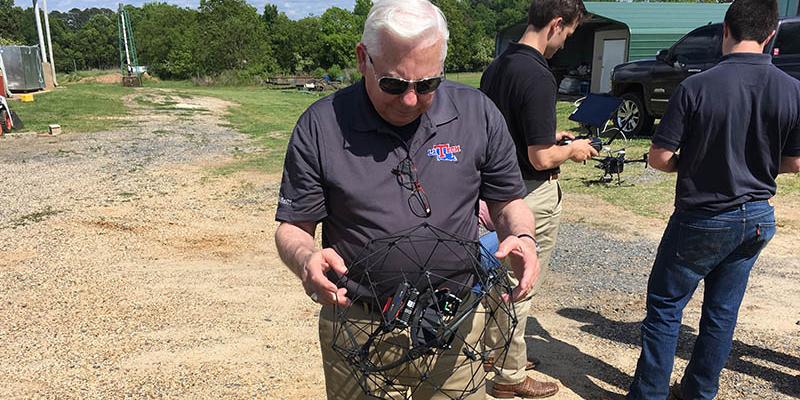Pipeline Condition Assessment with Drone Technology
Publicerad: 30 maj, 2018
Figure 1-2. The Drone PCA Demonstration for an Active 72” Storm Drain Line. Figure 3-4. The Drone PCA Demonstration for the 18” and 24” above ground pipelines which were dry and new lines.Figure 5-6. Samples of inspection images of the 18” and 24” above ground pipelines by Elios drone equipped with CCTV. Figure 7. Sample of inspection by using the thermal camera for an active 72” storm drain line.
As a result of a graduate level class that Dr. Tom Iseley is teaching at LA Tech on entrepreneurship in construction, the class was introduced to the state of practice of drone technology for the application for industrial inspection.
Brice Gillikin is a civil engineering graduate student. He has worked for his family business for about 10 years. The family business is based in Bastrop, LA and specializes in industrial inspections. During the past few years, they have adopted the utilization of drones due to time and cost savings as well as increased safety. Recently, they purchased a drone specifically designed for confined space applications including pipelines. For the course project, Brice is developed a business plan for the application of drone PCA. His business plan includes forming a partnership with the TTC.
The TTC is located in Ruston, LA and enjoys an excellent working relationship with the Department of Public Works (DPW). When Mr. Darrell Caraway, DPW Director, was approached about utilizing drone PCA technology, he was eager to cooperate with a pilot project. The City of Ruston – DPW has entered into a partnership with TTC to establish a Living Lab which will permit the initial and long term evaluation and validation of most technical solutions involved with underground infrastructure challenges.
The drone PCA demonstration project took place on April 27, 2018. The objective was to evaluate the flyability and imaging data acquisition capability utilizing the Elios drone equipped with CCTV and thermo imaging cameras in 18”, 24” and 72” diameter pipelines. While there was a short notice for the drone PCA demonstration, TTC was excited to have representatives from CUES Inc., HDR Inc., Atkins, CDM Smith, HGA LLC., KSA Engineering, FTN Associates, and Deforest Engineering Consultants.
The 72” pipeline is an active storm drain lined owned by the City of Ruston. This pipeline had an average depth of flow of about 1-foot. The 18” and 24” pipelines were dry, new lines located above ground so that the demo attendees could get an excellent exposure to the precision of the controls and the imaging capability.
Collision-tolerant drone
The Elios drone is a collision-tolerant drone (collision-tolerant up to 15 km/h (9.3 mi/h)), designed for the inspection and exploration of inaccessible places. The protective frame of Elios is sophisticated. It is decoupled on three axes from the inner frame with the drone utilizing a gimbal mechanism. This ingenious decoupling mechanism is what allows Elios to remain stable in the event of a collision. Elios’ protective frame is made up of carbon fiber covered with a soft coating so that it can sustain collisions.
The drone can reach a speed up to 4 m/s (787 ft/min). The protective frame is spherical and comes in one size only. With a diameter just below 400 mm (15.7 in), it is slightly smaller than the smallest standard manhole access. Elios embeds a full HD camera, a thermal camera, and an on-board LED lighting system with remotely adjustable intensity. Mounted on a rotatable head the cameras can capture images looking above and below the drone.
Detect invisible cracks
The thermal camera can detect the cracks that are invisible which can help to anticipate potential major degradations. The intensity of the 5 arrays of high-efficiency LEDs provide even lighting in front, top, and bottom of the robot. The lighting can be adjusted remotely using the ground control station. When changing the pitch angle of the camera head, the light beam is adapted, always providing the right lighting.
Leader for almost 30 years
TTC has been a leader in advancing all areas of trenchless technology for almost 30 years including PCA technology. In 1997 & 1998, TTC was selected by ASCE to evaluate the Sewer Scanner and Evaluation Technology (SSET) which was developed by TOA Grout and CORE Corp. base in Japan. The SSET was the first application of side scanning technology which permitted generating an unfolded (flat) image of the inside of a pipeline. Now, practically all manufacturers of CCTV equipment have developed similar capabilities. The SSET incorporated gyroscopic and inclinometer technology to track position utilizing XYZ coordinates. Through a $3.2 million grant from NIST, TTC developed the FutureScan technology currently commercialized by CUES through an exclusive license with LA Tech.
During the fall quarter of 2017, Dr. Iseley taught a graduate level course on Pipeline Condition Assessment and Integrity Management (PCA&IM). This was an unconventional course which brought international leaders in the area of PCA&IM into the classroom through the utilization of Skype.
During the past few years, TTC has lead the way in developing advanced Specialty Schools. The 3rd 5-day Auger Boring School will be conducted beginning November 12, 2018. The 3rd 5-day Utility Investigation School is being planned for February 2019. The 1st PCA&IM School is being planned for April 2019. In addition to these Specialty Schools, TTC partners with BAMI-I to conduct 4-day classroom CTAM training. The 3rd course will be sponsored by the UCTA North Texas Chapter.
TTC has committed to the following three initiatives which will advance the industry internationally. These initiatives are:
• Establishing the TTC Underground Infrastructure Campus (UIC)
• Developing the Barbera Underground Infrastructure Research & Training (BUIRT) Facility.
• Establishing TTC Living Lab in partnership with the City of Ruston – DPW

Elios drone equipped with CCTV and thermo imaging cameras.